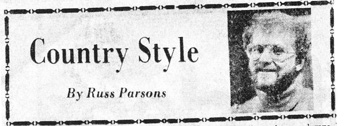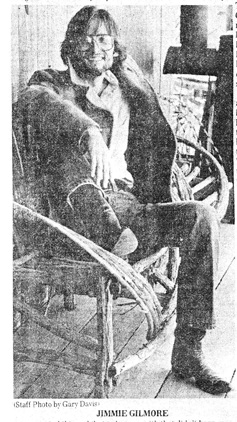Fire in the Water, Earth in the Air: Legends
of West Texas Music
by Christopher Oglesby
Published by the University
of Texas Press:
"As a whole, the interviews create
a portrait not only of Lubbock's musicians and artists, but also
of the musical community that has sustained them, including venues
such as the legendary Cotton Club and the original Stubb's Barbecue.
This kaleidoscopic portrait of the West Texas music scene gets
to the heart of what it takes to create art in an isolated, often
inhospitable environment. As Oglesby says, "Necessity is
the mother of creation. Lubbock needed beauty, poetry, humor,
and it needed to get up and shake its communal ass a bit or go
mad from loneliness and boredom; so Lubbock created the amazing
likes of Jimmie Dale Gilmore, Butch Hancock, Terry Allen, and
Joe Ely."
"Indeed, Oglesby's introduction of more
than two dozen musicians who called Lubbock home should be required
reading not only for music fans, but for Lubbock residents and
anyone thinking about moving here. On these pages, music becomes
a part of Lubbock's living history."
- William Kerns, Lubbock Avalanche Journal
|
Country Style was an entertainment column
written by Russ Parsons for the Lubbock Avalanche Journal in
the 1980s, a fertile time in Lubbock music history. He has graciously
shared many of his articles with us at www.virtualubbock.com
for our readers' enjoyment.
Russ Parsons currently is the food editor for the Los Angeles
Times.

LUBBOCK AVALANCHE JOURNAL
(posted on www.virtualubbock.com by
permission of author)
I had heard a lot about Jimmie
Gilmore before I ever met him. I knew he was Lubbock boy
who almost made good with a band called Jimmie Dale & The
Flatlanders, a group that included Joe Ely and Butch Hancock. I knew that when that deal
soured after recording an album that was never released, it had
affected Gilmore deeply and he had joined some Eastern religious
group headed by a kid named Guru Maharaj Gi.
 I
knew he was a sensitive man and a good lyricist from his songs
''Dallas," "Lights" (recorded by Ely as "Treat
Me Like a Saturday Night") and "Tonight Think I'm Going
To Go Downtown," also recorded by Ely. I
knew he was a sensitive man and a good lyricist from his songs
''Dallas," "Lights" (recorded by Ely as "Treat
Me Like a Saturday Night") and "Tonight Think I'm Going
To Go Downtown," also recorded by Ely.
I knew from watching him on stage that he has an aura about him,
a kind of glow especially when he's singing.
But, as is almost always true, trying to know a man by his history
is like trying to know the ocean bottom by looking a the choppy
surface. There is much more to Jimmie Gilmore than meets the
eye.
The episode of The Flatlanders' album is one of those tangled
webs that can only happen when artists meet businessmen. Today,
eight years after the actual recording session, Gilmore still
does not under stand exactly what happened.
"I ended up feeling, I can't even say deceived because it
wasn't that clear cut," he says. "I never did get the
vibe that any person actually misrepresented anything, but it
got to be this confused situation where we had made this record
that we expected this and that to happen when that didn't happen.
"They (the record company) released a couple of DJ promotional
copies, feelers I guess, but that was all. For a long time I
thought. 'Wow, we've made it.' Even now, I'm still proud of the
music. I'm never sick of it. We never were a tight, cooking band.
We were just a fun-time band that had a lot of great material.
The Flatlanders went a whole lot more on creative energy than
finesse"
Indeed, that is a fairly accurate description of Gilmore, the
musician. His voice is not one of those appealing, pretty ones
you're apt to hear on the radio, but instead high, haunting one
which grabs you with its power.
Gilmore is a philosophical, introspective person constantly trying
to understand the world around him and how he fits into it. He
once was disillusioned and confused, not only about the business
aspect of music but about the fundamental morality of it.
He said. "Basically, I kept finding a whole lot of psychological
things in the whole atmosphere of the music business that I couldn't
handle at the time. The confusion of the record thing was one,
but not the heaviest. I found myself asking what's music for.
I got into this whole consciousness of what are my motives on
stage. What are my reasons for being there. Are they honorable?
"I didn't think about it in quite those terms, but those
kind of thoughts kept drifting across my mind. I began to be
very reflective and real questioning of what the whole thing
was about. I came to the conclusion that I didn't know what I
was doing. I didn't know what it was for. I didn't have a proper
understanding of why I was doing a lot of this stuff. It wasn't
just in the music world either.
"I began questioning where I was at in my whole life."
A friendship with Tommy
Hancock and his Supernatural Family Band turned Gilmore on
to the Maharaj Gi. What he says he has learned from the religion
is not so much the answers to his questions, but a way to find
the answers.
"It has made me feel a whole lot more like the solution
to my problems lie more within me instead of within changing
my circumstances," he said. "A lot of what is going
on within me is trying to integrate what I got from that whole
professional musician thing. I've come to a certain understanding
of it now. I mean, music exists in the darkest of places, but
it si the lightest of forces. If I can have that there in my
music, I'll have succeeded beyond any professional goals.
"To me, the purpose of music is to uplift people, to make
them feel better, to make people see a brighter side. Even the
most low-down blues singer, if you can empathize with him even
if he is singing about something negative or bad, the fact that
he's singing about it with a certain kind of life can help put
life into you.
"It's like all those questions I was asking so deeply got
answered for me. Not in an absolute, positive, clear kind of
way, but there's a direction to my thinking now that makes it
feel together.
* * * * *
Gilmore guests with Lights (formerly the David Halley Band) from
11 a.m. to 1:30.p.m. Tuesdays and Thursdays at Jug Little's Barbecue.
More articles by Russ Parsons
Butch Hancock - Joe Ely, Buddy Holly & Joey Allen - David Halley - Larry Welborn
or
Return to Home
|




